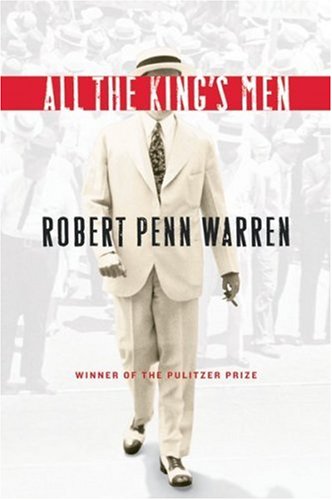Country: USA
Genre: Literary/Drama
Pages: 661
This is another Pulitzer Prize winner and one of those books everybody name drops when you talk about southern literature. It's THAT book who finishes a conversation, but nobody had ever read. You know? "I love southern writers, they are so unique. Faulkner was so great...and...and...Flannery O'Connor too. And All The King's Men was terrific". I love going to work on this kind of book and knowing actually what I talk about when its title shows up in a conversation. As far as the content is in question, Robert Penn Warren's magnus opus holds up and managed to keep me at its mercy for a whopping six hundred and sixty pages. Although, there's something about this novel that kept bugging me and throwing me out of the loop. Its form is split in between a very classic (somewhat too classic) narration and a weird, very modern (at the time) idea to put all the chapters in a chronologically scrambled order. I wouldn't mind either of them, but considering the length of the novel and the fact that they were both used by Warren made it for a frustrating puzzle sometimes.
The narrator is this guy named Jack Burden. He is the quintessential intellectual man, a history student becoming newspaper columnist and soon enough, aide to Governor Willie Stark, a fascinating, charismatic figure to him. All The King's Men is his story, intertwined with the political history of Willie Stark. In fact, due to an incident he will get pushed to provoke by his boss (that's how he describes Stark as soon as he gets hired, "the boss") will somehow strangely make his life and the political headline one and the same*. He will undergo a transformation from being the typical observing intellectual type (you know, the guy that judges everything from a distance) to being somebody directly implicated in history and acknowledging the importance of his time and place.
It's a really ambitious book, that I can give Robert Penn Warren. That's a perk and a problem of All The King's Men. Since he prefers a very highly thematic approach to a chronological or even a situational one. Let me explain. It's one of those life-and-times-of novel. And that's exactly what you get, but instead of going in a chronological order, you keep skipping to important periods in Jack's life, like he was having a series of very long flashbacks. Time is an important theme in All The King's Men and it shows in all kinds of ways. Sometimes, the action will slow down to an unbelievable point where all there is on the page is a description of people masticating or a description of a face that moves. Warren keeps alternating in between long, lifetime-sized time frames and this sort of micro-management. Sometimes it's hard to adjust and you're left wondering what the fuck you're reading. All The King's Men has the pacing of a free jazz tune.
But if you take a step away from it, you can't help but appreciate the scope of Robert Penn Warren's ideas. Novels that carry so many intellectual preoccupations such as time and history are rarely that packed with action and suspense and often consist of a dude, sitting on a rock, thinking about his life. Seeing Jack Burden tearing himself free from the world of ideas has something exhilarating. The non-chronological approach of Warren to his novel also underlines his idea that the moment is fabricated from your past and is somewhat dictating the future. All The King's Men is an intense gym class for your brain (and sometimes it shows in the stylistic choices of its writer) but it feels very rewarding to go through the trials of Jack Burden's life with him. It's very worthy of the Pulitzer Prize it got, but it's not for everyone. It's not the straightforward portrait of a crooked politician that people think it is. It's the life of a complicated intellectual who gets very involved in state politics. Definitively not everybody's cup of tea.
*I know I sound apocryphal here, but if I wouldn't I'd give you a huge spoiler.

